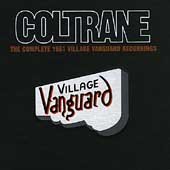
- Format: FLAC

Nov 1, 1961-Nov 5, 1961
Unlike the knotty difficulties in trying to untie the various knots in the Classic Quartet box of Impulse recordings, the Vanguard sessions represent something else in the canon of John Coltrane's work. In 1961, Coltrane was still experimenting with his quartet format and trying to work in the proper coloration of voicings needed to give his music the proper force and expression he pictured it to have. Something further than Giant Steps and My Favorite Things, but nonetheless shaped and textured by them. To try and discuss the music contained on these four CDs -- to tell something about it that might in some way reveal it to you -- would be completely stupid. What's more important is that the box itself exists and brings together most of the disparate pieces of a particularly strange puzzle, but not all. The music contained on these CDs represents tunes that were recorded for the eventual purpose of release on November 1-3 and November 5, 1961. The quartet does appear here -- Coltrane, McCoy Tyner, Elvin Jones, and Jimmy Garrison -- but there is also the addition of Eric Dolphy, since it was a quintet for these dates at the very least, an oud player on some tracks named Ahmed Abdul-Malik, and Roy Haynes occasionally sitting in on drums as well as Reggie Workman alternating in the bass chair. What it adds up to is some of the most exploratory music Coltrane ever recorded -- and it was done not only in front of a live audience, but also in the presence of some mighty hostile critics. It was on this fire ground of the test that Coltrane revealed for the first time his interest -- as well as Dolphy's -- in the Indian motivic mode of improvisation, his fascination with the odd time signatures of African rhythms, and the manner in which he used scalar, modal, and harmonic forms as integrational aspects to both composition and improvisation. And while its full articulation would come on later studio recordings and in later performances, this laboratory effect offers plenty in the way of revelation here. Originally, the Vanguard performances were released on four different albums: Impressions (two of the four tracks it featured), Live at the Village Vanguard, The Other Village Vanguard Tapes, Trane's Modes, and From the Original Master Tapes. This is the first collection that brings together all 22 performances of nine different tunes recorded on those four evenings. Yes, there was a lot more music played during those evenings, but producer Bob Thiele recorded these performances with the probable intention of release. There are four versions of "India" and "Spiritual," three each of "Chasin the Trane," two of "Naima" (one of them very different from the Atlantic version, one with an inverted melody), two each of "Greensleeves," "Impressions," and "Miles' Mode," and one each of "Brasilia" and "Softly as in a Morning Sunrise." The obvious reason for comparison is the difference in color and tone between the Haynes/Workman rhythm section and the Jones/Garrison one. The other is how differently Coltrane and Dolphy would play together night to night. One evening Coltrane would open and close a tune, letting Tyner and Dolphy solo, and the other it would be the reverse, and the instrumental variations would shift from tenor to soprano in Coltrane's case to alto and bass clarinet in Dolphy's dig-his-bass clarinet solo on "Naima." Here on these four CDs are the exhaustive discoveries of a lifelong search and the beginning of a kind of restlessness in Coltrane's life that would consume him. Musically, the music found here is as fine as anything ever recorded in jazz history. These performances are remarkable in their certitude and in the generosity of their communication as well as in the depth and profundity of their statements. Forget the single-disc compilation, this set is one of the most important live sets from the '60s.